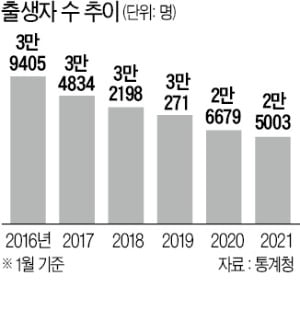The number of births in the first month of the new year reached a record low as of January. The’natural decline in population’, where the number of children born was less than that of those who died, continued for 15 months. Marriage is also falling sharply in the aftermath of Corona 19, raising concerns that the population cliff will be steeper.

According to the’Population Trends for January 2021′ released by the National Statistical Office on the 24th, the number of births in January this year was 25,033, down 1,675 (6.3%) from the same month last year. This is an all-time low as of January since 1981, when related statistics were started. The number of births has been changing the record low as of the same month for 58 consecutive months since April 2016. However, the decline in the number of births in January this year (6.3%) was slightly lower than in December last year (7.8%).
The number of deaths in January was 27,171, down 1325 (4.3%) from a year ago. However, the population naturally decreased by 2177 people, more than the number of children born.
The decline in birthrates is likely to worsen in the future. This is because marriages, which can measure the number of births in the future, are showing a sharp decline. The number of marriages in January this year was 16,280, a decrease of 3539 (17.9%) from the same month last year, recording the minimum as of January. Compared to last year’s November (-11.3%) and December (-11.2%), the decline also increased.
“Marriage has been decreasing since 2012 due to changes in youth values, etc.,” said Kim Soo-young, head of the Population Trend Division of Statistics Korea.
The number of divorces in January was 8373, a decrease of 457 people (5.2%) from the same month of the previous year. It is explained that the result of the divorce processing period lengthened due to the adjournment of the court due to Corona 19, while marriages decreased.
Korea is the world’s least childbearing country. The total fertility rate, which refers to the number of children a woman will have in her lifetime, was 0.98 in 2018, 0.92 in 2019, and 0.84 last year, reaching the level of 0 for the third consecutive year. According to UN demographics, Korea is the only country in the world with less than one total fertility rate among 198 countries. There are many concerns that the side effects of the population cliff, such as worsening employment difficulties in the education sector due to a decrease in students and a decline in economic productivity due to the aging of the elderly workforce, will increase.
According to the February domestic population migration statistics released by the National Statistical Office on the same day, the number of domestic mobiles last month was 706,000, down 75,000 (9.6%) from the same month last year. The decline was the largest since October 2019 (-10.9%). This is interpreted as a result of the contraction in housing transactions.
Reporter Eun-seo Koo [email protected]
Ⓒ Hankyung.com prohibits unauthorized reproduction and redistribution
